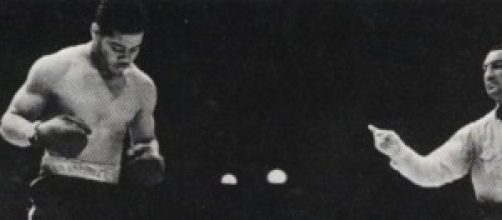Max Baer, once a feared heavyweight champion of the Golden Era of 30's, had said about him:
"Fear is standing in front of him in the ring, knowing this is one of the nights he wants to go home early."
He was talking about Joe Louis of course. The man whose face was so rigid and expressionless that even amidst a rough bloodied 15-round war he looked like a bored grandpa sitting in his backyard listening to the Sunday morning radio.
He was not gigantic or overweight for that matter, but in the ring he moved cold and slow like an eighteen wheel truck, while his concentration was par to a Buddhist Monk and his punching precision to a Japanese Calculator.
Even before his first retirement he had already fought 60 times, winning 59, with 50 devastating knockouts. This is the longest streak of Heavyweight Championship defenses, and an unparalleled era of ring domination.
The interesting fact is for a good part of this thirteen years of undisputed championship Louis hardly even sweated in the ring. He was like a minimalist poet who wrote his poetry with his fists. Until he was sure that the words - his punches - incite the desired effect - smashing the opponent's jaw - he didn't allow himself to spend them. In most of his fights he entered the ring like some kind of a broke poet, fixing his eyes with almost melancholic unworldliness on his opponent's every move, waiting for the right moment.
Waiting for the first spring of the slightest sign of a mistake, which he then punished with his barrage of short yet devastating punches.
Burt Sugar, the noted historian and minute observant of the ring, called Louis "the most economic puncher in heavyweight history" whom every single movement in the ring was thought for and calculated.
He acted like a computer program designed to solve energy consumption optimization problems.
And he was the same, with his words, outside the ring as with his fists inside it. Short and simple, yet effective and precise. In the world of Prize Fighting where bragging and dirty-mouthing your opponent has to come to pass as almost a virtue, Louis had made a habit of answering journalists and interviewers with simple yet witty and poignant responses.
When he was told that many youngsters envy his status, he had said: "For going to heaven, you have to die first."
When they had warned him about the carefully designed strategy of Billy Conn to outbox him, he had said, smilingly: "Everybody's got a plan, until they get hit."
When they pressed him not to join the US Army as kind of a protest against the treatment of Blacks in America, he noted: "There are lots of things wrong with America, but Hitler ain't gonna fix them."
It was such a pity that the beautiful Joe Louis, this minimal poet of the ring, was led to bankruptcy by IRS in his later years. That he was living off the charity of loyal fans the last ten years of his life, that he suffered from Paranoia and cocaine addiction, and that he moved around in a wheelchair as a consequence of severe heart conditions.
The same Joe Louis who had said: "As long as you have to tell them who you are, you are nobody!"

